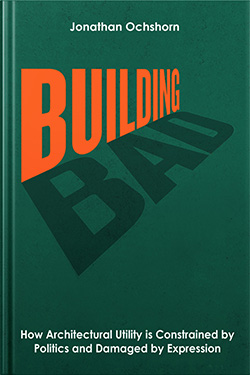Building Bad: How Architectural Utility is Constrained by Politics and Damaged by Expression
contact | contents | bibliography | illustration credits |
PREFACE
This book grew out of my longstanding interest in developing an objective theory of architecture, one that accounted for architecture's subjective dimension without succumbing to the siren's song of stylistic advocacy. Ultimately, my target became focused on the nature of utilitarian function in architecture and, in particular, how such functionality is constrained by political and economic forces, while also effectively undermined by forms of expression.
There are other books that more systematically list utilitarian and expressive functions of buildings, or explain their historic evolution, or promote strategies and styles to make buildings "better." My intention, in contrast, is the "ruthless criticism" of functionality in contemporary architectural practice, analogous to Marx's comments in a letter to Arnold Ruge written in 1843: "If we have no business with the construction of the future or with organizing it for all time, there can still be no doubt about the task confronting us at present: the ruthless criticism of the existing order, ruthless in that it will shrink neither from its own discoveries, nor from conflict with the powers that be."1 Thus, there is both humility and arrogance in my approach: humility in that I refrain from promoting any particular style of architecture, least of all my own; arrogance in that I subject a wide range of contemporary architectural discourse and production to unapologetic criticism. This book therefore fills a rather unique niche, which I believe will be of interest to many readers both inside and outside the discipline of architecture.
In 1983, as a young adjunct professor of architecture at the City College of New York, I submitted an article on "Fashionable Building" to the Journal of Architectural Education. In rejecting the submission, the executive editor explained that "the target is too big, and you used a shotgun." More than 35 years later, the present book elaborates on the notions first outlined in that unsuccessful 1983 submission. If I'm still using a shotgun, it's precisely because the target is big and spread over quite a few intellectual domains. While this weapon might not kill the beast, I'm hoping to at least get its attention.
Notes
1 Marx, "Letters from the Deutsch-Französische Jahrbücher."
contact | contents | bibliography | illustration credits |

